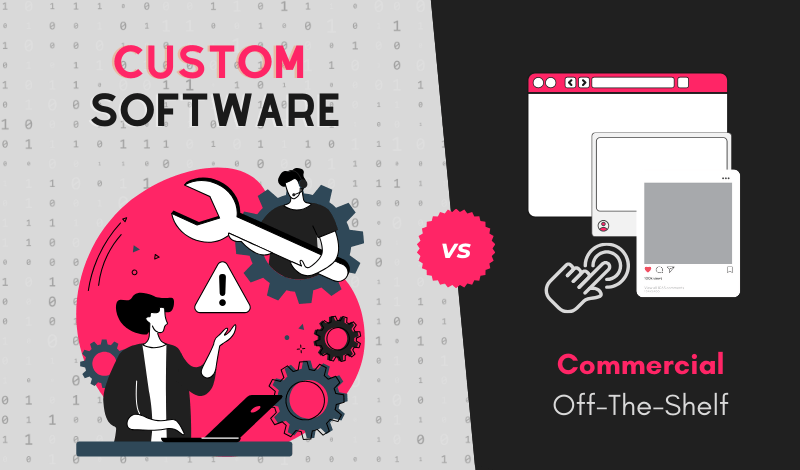Software tailoring stands out from the commercial off-the-shelf options because it can be developed and used in many different ways.
Unlike generic software that only does a few things or has functions that aren’t needed. Businesses can get more productivity gains, cost savings, and competitive benefits if they choose customized solutions instead of ones that work for everyone.
Find out below what Tailored software is, and why you should choose it.
What is Software tailoring?
Customized software is often referred to as “tailor software” because much like a tailor who creates a bespoke suit, it is specifically designed to meet the unique requirements of an individual or organization.
Just as a tailor carefully measures and crafts each garment to fit perfectly, tailor software is created with meticulous attention to detail and personalized features.
Difference between ready-made software and custom software development

As the name suggests, tailored software is made to meet the unique needs of a person or organization. It is made from the ground up and has features and functions that are made to fit specific processes and workflows.
This amount of customization makes sure that the final product fits the user’s needs perfectly, making it a better and more efficient solution.
On the other hand, ready-made software is made by vendors and can be used by many different types of businesses or groups.
Even though they may have a lot of features, they are not made for a certain type of workflow. Even though ready-made software is available right away and doesn’t cost much, it might not have all the features that a certain company needs or it might have features that aren’t important to how they run.
In summary, while ready-made software may provide quick access to basic functionalities at a lower cost, tailored software emerges as the ideal solution for those seeking personalized products that perfectly align with their unique requirements.
5 powerful reasons to choose custom software
From small businesses to large enterprises, software customization has a lot of advantages. It allows organizations to tailor functionality, user interfaces and data management processes according to their specific needs, allowing businesses to improve their speed, cut down on manual work, and improve the accuracy of their operations.
Here’s why it’s vital to opt for custom software development.
No such thing as “One size fits all” solution
In the rapidly changing world of technology we live in, it’s becoming crystal clear that there is no “one size fits all” answer for software. Businesses in different fields have different needs and requirements that cannot be addressed by commercial off-the-shelf software.
This is where the idea of customizing software becomes very important. Businesses can make sure that their software solutions are as efficient and effective as possible by customizing them to fit their needs. It lets companies match their technology to their own workflows, methods, and goals.
Consultation
When it comes to software consulting, there are a number of key perks that make it a great investment for businesses. Getting information and direction from experienced software consultants will help move your business forward, no matter how big or small your business is.
Targeted solution

When it comes to addressing specific needs, custom software development is the personalized solution businesses should consider. Even though commercial off-the-shelf software may seem handy at first, it often doesn’t meet the specific needs of a business. In the long run, it’s a waste of time and money.
By sharing what your goals and concerns are, software can be customized to provide you with the best solution to address them.
Design

During the software design phase, businesses and developers should be involved together in the design process to make sure that the software works well for users and is easy to use. This helps the designers plan the entire user flow with key objectives in mind that align with users.
Modifications
Compared to ready-made options, this is where custom software really shines. With custom software, you can add, take away, or change features based on how your business works. While most ready-made software doesn’t let you change much about how it works.
Stay ahead of your competition

If you use the same tools as your competitors, it will be harder for you to stand out in the market. However, with customized software, you can make new features and functions that make you stand out from the crowd to give you the advantage of faster and more efficient solutions to your target audience.
Investing in software customization not only helps you strengthen your competitive edge but also positions you as an industry leader committed to surpassing customer expectations.
Seamless integrations

Easier integration not only enhances user experience but also increases efficiency and effectiveness, it makes it easier for data to move between different systems, getting rid of manual steps and lowering the chance of mistakes.
When companies use commercial off-the-shelf options, it can be hard for them to work with other software tools. This can slow down work and limit growth possibilities. On the other hand, customized software that integrates well gives you an edge over the competition.
Easier scalability

As your business grows, so will your needs. Ready-made software may seem like a good idea at first, but as your business grows, it may become more expensive. Most of the time, these off-the-shelf options have fixed features that might not fit your needs as they change.
In the long run, it’s cheaper to build custom software that can grow with your business and scale with it be avoiding to pay for unnecessary features and ensure that it can seamlessly handle increased workload and user demands.
Maintenance and support

When it comes to maintaining and supporting custom-built software, it is important to be able to easily reach a support team of expert developers. These experts will have the knowledge to give in-depth technical help and take care of any maintenance needs that may come up.
What to look out for when choosing tailored software

By carefully considering certain aspects before choosing tailored software for your business needs, you’ll ensure that you make an informed choice that aligns with your goals and maximizes efficiency within your organization.
Below you’ll find the most important aspects to look out for when opting for customized software development
Development methodology

Whether you’re an Agile advocate or a Waterfall enthusiast, understanding these methodologies will empower you to choose the right approach for your software development journey.
Agile methodology

The agile method is all about being flexible. It puts an emphasis on working together, developing in small steps, and often getting feedback. With Agile, teams can react quickly to changes, continuously improve their work, and give clients value in less time.
Waterfall Methodology

Waterfall, on the other hand, is a more standard method with a set order of steps. It’s like a waterfall: you have to finish one step before you can move on to the next.
Even though it may not be as flexible as Agile, Waterfall gives the development process order and clarity in terms of requirements and solutions.
Depending on the needs of the project, both approaches have their pros and cons. Agile works well for projects with needs that change or standards that aren’t clear from the start, while Waterfall works well when requirements are clear from the start.
Software platforms

Choosing the right software development platform can be overwhelming. With so many different types available, it’s hard to know which one is the best fit for your project. Whether it’s web only, mobile only or cross platform, which one are you going to choose?
Imagine spending hours researching and testing different software development platforms, only to end up with one that doesn’t meet your users’ needs or slows down your progress. It’s frustrating and wastes valuable time and resources.
By understanding the unique needs of your customers and business processes, a custom software platform can be designed to address those specific requirements.
This ensures that you have a solution that is scalable and flexible enough to adapt as your business evolves.
Used technologies

Python, JavaScript, and PHP are among the most widely used and versatile programming languages in custom software development.
Python, known for its simplicity and readability, has gained immense popularity due to its extensive libraries and frameworks.
It is often used for web development, data analysis, machine learning, and artificial intelligence applications. Its flexibility allows developers to quickly prototype ideas and build robust software solutions.
JavaScript, on the other hand, is primarily used for front-end web development. It enables interactive user interfaces and dynamic content on websites. With frameworks like React.js and Angular.js, JavaScript has become a powerful tool for creating responsive web applications.
PHP is a server-side scripting language that is widely used for web development. It excels in handling database operations and server-side processing. Many popular content management systems (CMS) such as WordPress are built using PHP.
In conclusion, Python, JavaScript, and PHP are three widely used technologies in custom software development due to their unique features and extensive support from the developer community.
Whether you’re looking to build scalable web applications or create interactive user interfaces, these languages provide the foundation necessary to bring your ideas to life efficiently and effectively.
Integrations

Integration is the process of putting together different software programs or computer systems so that they work together. It lets data and information be shared between different platforms, making it possible for businesses to run smoothly across different areas and functions.
By integrating various components within a custom software solution, an organization can improve workflows, automate tasks that are done over and over again and increase total efficiency.
Whether it’s connecting customer relationship management (CRM) systems with marketing automation tools or connecting e-commerce platforms with inventory management systems, smooth integration helps businesses run more efficiently.
Integration makes sure that data flows smoothly and automatically between different apps. This cuts down on human mistakes and makes sure that data is correct and consistent throughout the whole system.
Modifications

Custom software development is now a must-have for businesses that want to stay ahead of the competition. But it’s not enough to just make a piece of software and call it job done. As companies and user needs change over time, the software needs to be modified to keep up.
Modifications can include things like fixing bugs, adding new features, Performance optimization or adding security updates.
User experience is a big reason why changes are made. By constantly listening to users’ opinions and ideas, developers can find places that need to be improved and make the changes that are needed. This iterative process helps your software evolve and makes sure it meets user standards.
Quality Assurance

Quality Assurance is Paramount. Quality assurance (QA) is a very important part of developing software because it makes sure that the software meets the standards and needs of the client.
In the QA process, the software is tested and evaluated very carefully at different steps of its development. This includes running functional tests to make sure all the features work as they should, performance tests to see how fast and efficient it is, and compatibility tests to make sure it works with different systems and devices.
Also bug tracking helps developers find and record any bugs or other problems that come up during testing. This makes it easier to figure out which problems are most important and fix them quickly, making sure that users have no problems while using your software.
By building a strong QA process into custom software development projects, businesses can offer high-quality solutions that meet client expectations while minimizing the risks of errors in functionality or performance.
Quality assurance is very important because it makes sure that every piece of custom-made software meets the highest standards of effectiveness and dependability.
Performance optimization

Performance optimization means making sure that software runs smoothly. Users are always asking for a high-performing software, so developers need to put code optimization and application speed at the top of their list.
Finding and fixing bottlenecks in the software design is part of performance optimization. It involves looking at the codebase to find places that might be causing slow response times or tasks that use a lot of resources. By improving these places, developers can make the system faster and more responsive as a whole.
Developers can make sure that their apps work well in a variety of situations by taking into account things like database queries, network latency, caching methods, and algorithmic efficiency.
Data management

Effective data management is crucial for success. With the increasing reliance on technology and the ever-growing volume of data being generated, businesses must prioritize the proper handling and utilization of their valuable information.
Data management has a set of practices and processes that make sure that data in unique software solutions is accessible, usable and secured. Every part of enhancing the value of business information is important, from storing data to integrating analysing it.
There must be strong data protection in place. This means putting in place encryption protocols, access controls, and regular audits to keep private information safe from being hacked or accessed by people who shouldn’t be able to.
In conclusion, custom software offers a myriad of benefits that can greatly enhance a business’s operations and overall success.
By tailoring software to specific business needs, organizations can gain a competitive advantage in their industry. Custom solutions are designed to address unique challenges and requirements, ensuring that businesses have the tools necessary to thrive in their respective markets. In addition, custom software provides high opportunity in marketing automation perspective to increase your customers.
We hope you enjoyed reading this blog post, and we’d love for you to stay connected with us on social media. Follow us on Facebook, Instagram, X, and LinkedIn for more great content!
If you want to get the latest updates from us in real-time, don’t forget to subscribe to our Newsletter – we’re always working hard to provide readers like you with the best content possible. So don’t miss out!
Also, If you interested in building custom E-commerce don`t forget to check out our article about E-commerce.




